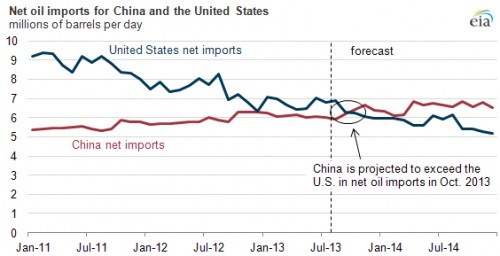
The Energy Information Agency's (EIA) August 2013 Short-Term Energy Outlook forecasts that China's net oil imports will beat the United States' by October on a monthly basis and 2014 on an annual basis, making China the largest importer of oil in the world - a dubious milestone.
Steady growth in demand has driven China to first place, while the US drops behind on robust oil production and flat demand.
US annual oil production is expected to rise by 28% between 2011 and 2014 to nearly 13 million barrels per day, primarily from surging shale oil, tight oil, and Gulf of Mexico deepwater plays. In the meantime, Chinese production, slow to adopt new technologies like fracking and deep water exploration, will increase much more slowly - a paltry 6%.
China's increasing demand
On the other side of the energy curve, China's liquid fuels use is expected to grow by 13% between 2011 and 2014 to more than 11 million barrels per day, while US demand hovers close to 18.7 million barrels per day, well below the 2005 peak of 20.8 million barrels. Those stats also accurately mirror the global divide growing between developed and developing economies.

Looking beyond 2014, with higher US oil production and declining demand, and China's rising demand and slower production, once China moves ahead of the United States to become the world's largest net oil importer, the gap will continue to grow.
Marshalling market forces
Of course skyrocketing US production makes this really a big development, according to Christoph Rulh, Chief Economist at BP:
Last year, the US had the world's largest increase in oil as well as gas production. Not only did oil production expand faster than in any other country, last year also saw the biggest oil production increase in the history of the US - a country which has produced oil since 1859.
Looking through a market-prism, he feels that there is a reason this happened in the US and not in China, despite the fact that both sit on vast unconventional resources. It has nothing to do with resource endowment below ground but everything to do with markets above ground. Innovation tends to limp along in economies where government control inhibits "the private reward for trial and error," and that holds true in energy markets just as in any other industry.
Allowing outsiders into Mexico
And where could the market boost oil production next? Mexico's President Enrique Pe?a Nieto wants to make overhauling Pemex his "signature issue." He wants outside oil companies to invest in Pemex's exploration to reverse years of decline in the country's giant, offshore Cantarell oil field. This prospect excites Big Oil, according to Bloomberg:
The prospect ... has caught the attention of companies such as ExxonMobil. Mexico needs to open up to "partnerships and collaborations and bringing technology" to bear on its resources, said ExxonMobil chief Rex Tillerson in June.
Inviting outsiders to invest in Pemex could also transform the psychology of business in Mexico. To change Pemex, Pe?a Nieto will challenge entrenched interests and probably the national psyche, from the oligopolies, to voters, unions and local officials. If he succeeds, he could tackle other monopolies and duopolies in power generation, telecom, and cable television, which generally all make life more expensive.


